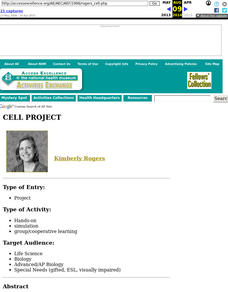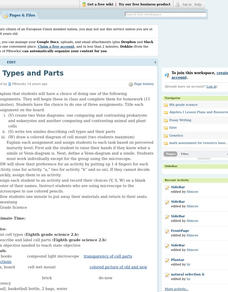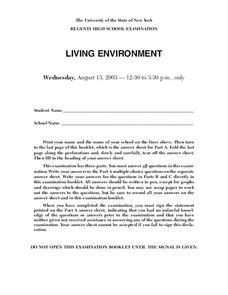Curated OER
The Cell
Young scholars visualize plant and animal cells, explain the parts of a cell and their functions and distinguish plant cells from animal cells. Working Students, in groups, must present a particular portion of a cell to the entire class.
Curated OER
Plant and Animal Cells - Are they Different?
Students observe the similarities and differences between plant and animal cells. In this cell activity, students use microscopes to observe self prepared slides of animal and plant cells.
Curated OER
Cells, Cells, Cells
Students explore plant and animal cells. Using household items, students create a three-dimensional model of a plant or animal cell. Students identify and label each cell part.
Curated OER
Creating Coacervates
Students create and observe coacervates. For this origin of life lesson, students create coacervates by mixing carbohydrate and protein solutions. They observe the life-like qualities of the structures and discuss the origin of life.
Curated OER
Travel Brochure for a Cell
Students create a brochure to entice readers to 'visit' their cell organelles and functions 'amusement park'. Students use humor and 'roadside attractions' for an inspiration - 'visit the ribosomes to watch proteins synthesized before...
Curated OER
Cell Transformation in Tobacco Leaf Disks
Students review the basic principles of plant cell structure, tissue culture, sterile technique, and cell transformation. Next students complete a plant transformation experiment using whole plant material in order to view evidence of...
Curated OER
Who Are We? An Introduction to the Life Within Our Bodies
Students examine cell structure, cell division, and the basic structure of DNA. They read and discuss a case study of DNA research, answer discussion questions, role-play the process of mitosis, and complete a DNA Fact or Fiction worksheet.
Curated OER
Cell Project
Students investigate cells. They discover what cells are, where they are found, what they do and what they are made of. They construct a giant cell that is posted on the bulletin board.
Curated OER
Cell Observation Exercise
Students take measurements of the distance between the objective and the slide when in focus with each objective. They determine the diameter of the field of view at each power in order to determine the size of the cells being observed.
Curated OER
Cancer: A Crisis of the Cells
Students analyze cancer data represented in graphs and charts. They describe the changes in cell structure and function as the result of cancer. They also examine phenomenas that are believed to cause cancer.
Curated OER
Cell Phones Create Dangers
Students research what laws, if any, relate to cell phones in your state and community. Students interview local law enforcement personnel to find out if cell phones have caused accidents in your town or city. Try to get statistics on...
LABScI
DNA Structure: Gumdrop Modeling
DNA molecules hold the secrets that make us unique. The fourth of 12 lessons explores the structure of DNA by building candy models. After building the models, young scientists break their models to begin the process of DNA replication....
Curated OER
Prokaryotes and Eukaryotes
Examine cyanobacteria cells as an example of prokaryotes and several other alga as examples of eukaryotes. Future biologists compare the two and notice the absence of nuclei in prokaryotes. These are classic activities for this purpose,...
Curated OER
Photocells II: The Photoelectric Effect in Photocells
It's not easy to find fabulous physics lesson plans, but School Power Naturally has put together a series of them. In this particular lesson, high schoolers learn about the structure and functioning of photovoltaic cells. They construct...
Curated OER
WET Science Lesson #5: Pass the Salt Please! (How Road Salt Affects Wetlands)
As an anticipatory set, biologists listen to the story of Ruth Patrick, a scientist who used algae to detect water quality. They observe a demonstration of osmosis and diffusion. In their lab groups, they place Elodea stalks in...
Curated OER
DNA, the Awesome Thread of Life
Students examine how traits are passed to offspring. In this genetic reproduction lesson students develop a model of dna and learn about its structure, replication and function.
Curated OER
Driving Safety and Distractions
Students research process necessary to add local or state law limiting such driving distractions as cell phones or other technological devices, interview city leaders or legislators, research areas that already have such legislation and...
Curated OER
Study Guide for Chapter 12: The Cell Cycle
In this biology worksheet young scholars map out and describe the process of mitosis for the nine questions. The last four questions are several combined in each.
Curated OER
Cellular Structure and Function
Students examine animal and plant cells using a microscope and participate in a class discussion about the functions of the organelles. For this biology lesson, students use microscopes and videos to better understand the functions...
Curated OER
Cells And Their Parts
High schoolers investigate different types and their parts. They differentiate prokaryote and eukaryote cells and create a venn diagram displaying differences or similarities. Students write ten similes related to the cells and parts of...
Serendip
DNA Structure, Function and Replication
Before a cell replicates, its DNA must replicate. Take advantage of a hands-on guided lesson to teach budding scientists how this happens. Using a set of nucleotide cards, learners become the DNA and work to create matching strands...
Virginia Department of Education
DNA Structure, Nucleic Acids, and Proteins
What is in that double helix? Explain intricate concepts with a variety of creative activities in a instructional activity that incorporates multiple steps to cover DNA structure, nucleic acids, and proteins. Pupils explore the history...
Curated OER
Living Environment
For this environmental lesson students complete a series of multiple choice and short answer questions on animal populations, cell structure and chromosomes.
Curated OER
Spotlight on Photovoltaics and Fuel Cells
Students research the Internet to find the pros and cons to alternative technology. In this investigative lesson students analyze structure and function of these systems and make observations of them.
Other popular searches
- Cell and Molecular Biology
- Biology Unit Cell
- Biology and Cell Organelles
- Biology Cell Structures
- Biology Cell Respiration
- Biology Cell Function
- Biology Cell Energy
- Biology Cell Membranes
- Biology Cell Types
- Biology Cell
- Biology Cell Nucleus
- Biology Eukaryotic Cell























